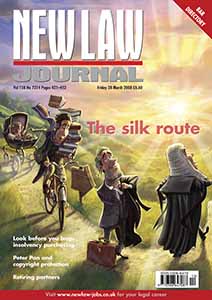
D v H [2008] EWHC 559 (Fam), [2008] All ER (D) 286 (Mar)
News In Brief
Accomodating 16 - and 17 - year olds, Intentional homelessness, Tolerated tresspassers
The NLJ Column
Sex Discrimination Act 1975 (Amendment) Regulations 2008 (SI 2008/656)
Roger Smith examines the Legal Services Commission's proposals for competitive tendering
Partner on retirement repayment, capital, annuity
Byron James takes the law into his own hands with the modern application of an age-old remedy
Lapsed warning, redundancy, EU Industrial action
The Budget will have made the chancellor few new friends at home or abroad, says Peter Vaines
MOVERS & SHAKERS

NLJ Career Profile: Ken Fowlie, Stowe Family Law
Ken Fowlie, chairman of Stowe Family Law, reflects on more than 30 years in legal services after ‘falling into law’

Gardner Leader—Michelle Morgan & Catherine Morris
Regional law firm expands employment team with partner and senior associate hires

Freeths—Carly Harwood & Tom Newton
Nottinghamtrusts, estates and tax team welcomes two senior associates







